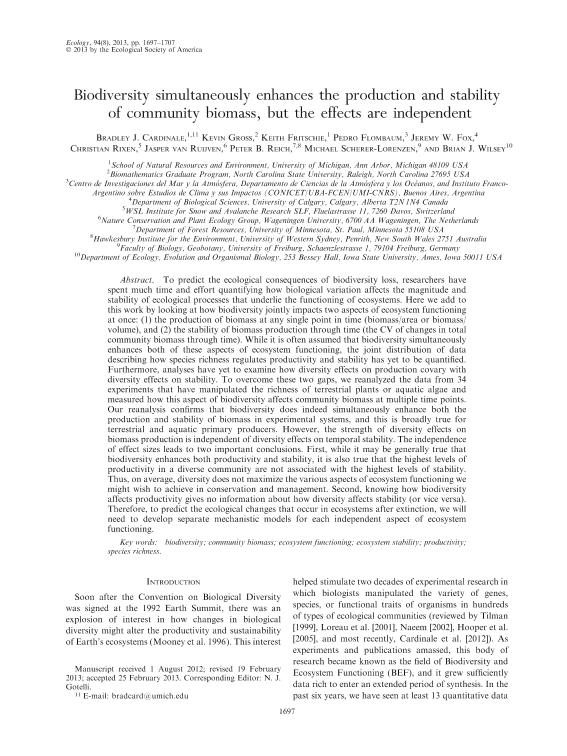Artículo
Biodiversity simultaneously enhances the production and stability of community biomass, but the effects are independent
Cardinale, Bradley J.; Gross, Kevin; Fritschie, Keith; Flombaum, Pedro ; Fox, Jeremy W.; Rixen, Christian; Van Ruijven, Jasper; Reich, Peter B.; Scherer Lorenzen, Michael; Wilsey, Brian J.
; Fox, Jeremy W.; Rixen, Christian; Van Ruijven, Jasper; Reich, Peter B.; Scherer Lorenzen, Michael; Wilsey, Brian J.
 ; Fox, Jeremy W.; Rixen, Christian; Van Ruijven, Jasper; Reich, Peter B.; Scherer Lorenzen, Michael; Wilsey, Brian J.
; Fox, Jeremy W.; Rixen, Christian; Van Ruijven, Jasper; Reich, Peter B.; Scherer Lorenzen, Michael; Wilsey, Brian J.
Fecha de publicación:
02/2013
Editorial:
Ecological Society of America
Revista:
Ecology
ISSN:
0012-9658
Idioma:
Inglés
Tipo de recurso:
Artículo publicado
Clasificación temática:
Resumen
Human domination of the planet is dismantling Earth´s ecosystems one gene, species, and biological trait at a time. To predict the ecological consequences of biodiversity loss, researchers have spent much of the past two decades quantifying how biological variation affects the magnitude and stability of ecological processes that underlie the functioning of ecosystems. Here we add to this work by looking at how biodiversity jointly impacts two aspects of ecosystem functioning at once: (1) the production of biomass at any single point in time (biomass area-1 or volume-1), and (2) the stability of biomass production through time (the CV-1 of changes in total community biomass through time). While is often assumed that biodiversity simultaneously enhances both aspects of ecosystem functioning, the joint distribution of data describing how species richness impacts productivity and stability has yet to be quantified. Furthermore, analyses have yet to examine how diversity effects on production covary with diversity effects on stability. To overcome these two gaps, we re-analyzed 34 experiments that have manipulated the richness of terrestrial plants or aquatic algae and measured how diversity affects community biomass at multiple time points. Our re-analysis confirms that biodiversity does indeed simultaneously enhance both the production and stability of biomass, and this is broadly true for a variety of primary producers. However, the strength of diversity effects on biomass production is independent of diversity effects on temporal stability. Independence of effect sizes leads to two important conclusions. First, while it may be generally true that biodiversity enhances both productivity and stability, it is also true that the highest levels of productivity in a diverse community are not associated with the highest levels of stability. Thus, on average, diversity does not maximize the various aspects of ecosystem functioning we might wish to achieve in the conservation and management. Second, knowing how biodiversity affects productivity gives no information about how diversity affects stability (or vice versa). If we are to understand and predict the variety of ecological changes that occur in ecosystems after extinction, it is imperative that we develop separate mechanistic models for each independent aspect of ecosystem functioning.
Palabras clave:
Biodiversidad
,
Productividad
,
Estabilidad
,
Funcionamiento de Ecosistemas
Archivos asociados
Licencia
Identificadores
Colecciones
Articulos(CIMA)
Articulos de CENTRO DE INVESTIGACIONES DEL MAR Y LA ATMOSFERA
Articulos de CENTRO DE INVESTIGACIONES DEL MAR Y LA ATMOSFERA
Citación
Cardinale, Bradley J.; Gross, Kevin; Fritschie, Keith; Flombaum, Pedro; Fox, Jeremy W.; et al.; Biodiversity simultaneously enhances the production and stability of community biomass, but the effects are independent; Ecological Society of America; Ecology; 94; 8; 2-2013; 1697-1707
Compartir
Altmétricas



